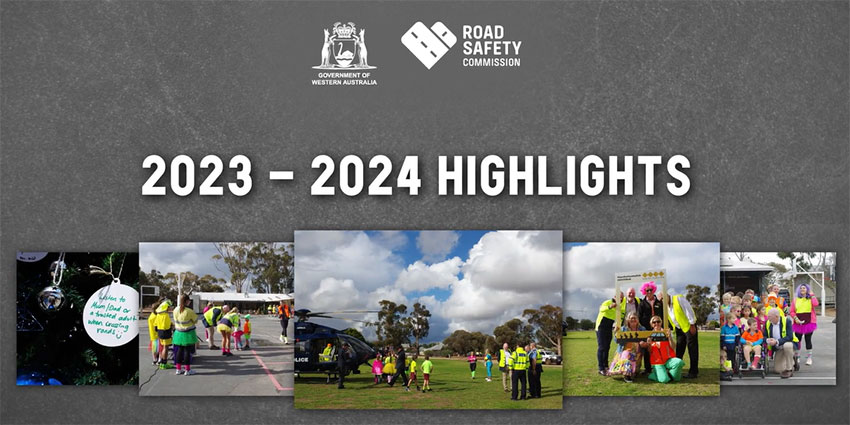
2023-2024 Highlights: the Road Safety Commission's key achievements
Our highlights video provides a visual overview of the Road Safety Commission’s 2023- 2024 projects and campaigns.
Key achievements over the past year include:
Mobile safety cameras closer to roll-out
The Road Safety Commission commenced procuring six mobile point to point safety cameras following successful trials in metropolitan and regional WA. The trailer-based cameras will be the most advanced in the country, capable of detecting spot and average speed offences as well as other risky behaviours including using a mobile phone while driving and not wearing a seatbelt.
Evidence shows that safety camera technology is an effective deterrent to unsafe driving behaviours. During the year, relevant legislation was amended to enable cameras to be used for enforcement of mobile phone and seatbelt offences.
Contract negotiations with the preferred supplier for the new cameras are well advanced, with the new cameras expected to be operational early in 2025.
Infringement Management Reform Program progressed
In anticipation of the introduction of new safety camera technology, the Road Safety Commission, WA Police and the Department of Transport continued working together to deliver a new system for issuing safety camera detected infringements in WA.
The modernised system, managed by the Department of Transport, will provide more customer focused digital services and flexible payment options for drivers who receive an infringement. It will also support the introduction of new safety camera technology.
eRideable road rules reviewed
More Western Australians are using eScooters and other electric rideable devices for travel and recreation than ever before. In 2023-24 the Road Safety Commission reviewed the eRideable road rules which were introduced to WA in December 2021.
The review included analysing relevant literature and data, partnering with the WA Centre for Road Safety Research to conduct field research, and reviewing stakeholder and public feedback. The eRideable review report will be published on the Commission’s website.
No one plans a crash campaign extended to include mature families
In May 2024, the Road Safety Commission launched an extension of its No one plans a crash campaign. The campaign targets two demographics who are at a pivotal stage of life where road safety is of heightened concern – parents aged 45 to 59 when their children are starting to drive, and young adults aged 17 to 22 who are still learning, as they are inexperienced drivers.
The five scenarios depicted highlight a range of crashes which could have been avoided or had a lower impact if the people involved had made better ‘one-off’ choices. Risky behaviours explored include mobile phone distraction, speeding, drink driving and not wearing a seatbelt.
No one plans a crash has proven to be the Road Safety Commission’s most successful behaviour change campaign to date, with 48 per cent of people taking action to make every journey safe after seeing the campaign.
First responder campaign collaborations educate community
The Road Safety Commission collaborated with agencies that provide post-crash response on WA roads to share important safety messages with the community.
The Anyone can save a life campaign launched in March 2024 as a joint initiative between the Road Safety Commission and St John WA. Based on a real story, the campaign highlights how anyone can save a life if they understand a few simple first aid actions and encourages road users, particularly new drivers, to complete a 15-minute free online emergency first aid course.
We partnered again with St John WA as well as with WA Police and the Department of Fire and Emergency Services (DFES) to educate drivers on the importance of clearing the path for emergency vehicles. Launched in May 2024, the Lights, Sirens, Action! campaign outlines four simple steps for drivers that aim to reduce confusion in an emergency and help first responders save precious seconds in responding to incidents.
The Seatbelts save lives campaign launched in June 2024 with the same three partners, bringing together serving officers from St John WA, WA Police and DFES to call for greater seatbelt compliance and to share candid insights into the true impact of not wearing seatbelts. This plea from those first on the scene in a crash comes as one in five people killed in a crash on WA roads over the past five years were not wearing a seatbelt.
A significant amount of work has been undertaken this year, and there’s plenty more to do, as we remain committed to reducing road trauma in 2024-25.


